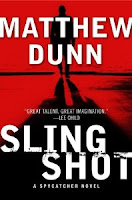Paperback published March 3, 2014
Genre: historical fiction
First paragraph: I chew my lower lip while I wait to see my father's gondola catch fire.
Page 56: I have done my best to stay hidden during daylight hours, observing, waiting - for what, I cannot say.A young boy, Luca, has accidentally caused the burning of his family's boat making factory after a fight with his father. He runs off to stay with an old friend, an oar maker, but soon disappears to become a gondolier for a well known artist, ferrying the artist to his various appointments and running errands by boat.
The novel is more than a coming-of-age story set among boat makers and gondoliers in 16th century Venice. It tells how Luca grows up to learn to handle responsibility, gets to know a world outside that of his small town, and falls in love. He discovers an old boat produced by his family in years past and sets out to restore and repair it, improving his boat making skills and working on making his own oars. How he handles misfortune, disappointment, even imprisonment, and how he redeems himself is the crux of the novel.
The setting is detailed and the atmosphere and feel of Venice is well done. We are immersed in the surroundings and lives of Venice's gondoliers and how they handle their boats, the techniques of boat makers and their exacting craft, and the skill needed to make boats of the highest quality boats.
I was captivated by the story and easily slipped into the Venice of the 16th century. The author has artfully woven Luca's story into the historical fabric of the times. I learned a lot about gondolas of the time, the laws of the city regarding boat making, and much more. My objective rating for this fascinating historical novel: 5/5.

Author's Bio:
Laura Morelli holds a Ph.D. in art history from Yale University, and has taught college-level art history in the US and Europe. Laura is the author of Made in Italy, Made in France, and Made in the Southwest (Rizzoli). The Gondola Maker is her first work of fiction. Visit her at Laura Morelli Facebook Twitter
For a list of other reviews of the book, visit iRead Book Tours
I received a complimentary review copy of the book for this tour.
Here is a Q and A that will tell us more about Laura and her writing.
1. Where are you from?
3. How did you do research for The Gondola Maker?
I grew up on a farm in Georgia. It was a wonderful childhood, climbing trees, riding horses, playing in the barn with cows and chickens, fishing in the lake. There were not many kids around so I learned to be independent. I read everything I could get my hands on; the used bookstore in town was one of my favorite spots. I still remember the smell of it! I always had the idea that I would write books, and I dreamt of writing a novel for as long as I can remember.
How did you start writing?
I was educated as an art historian. Those of us in academia are trained to write in a specialized style that comes across as dry and dull, full of terminology that is inaccessible to all but those of us who spend many years studying the field. In the end, this kind of writing strips out the passion that is so inherent in the arts, even though of course I hold great respect for the rigor of scholarship and those who publish exclusively in academia. Art history is the most fascinating subject in the world!
I realized that I enjoyed writing for a more general audience and that I had an opportunity to bring art history to a wider audience through my writing. I try to bring both the knowledge as well as the excitement of art history to my readers. I also try to capture the excitement and passion I felt when I first discovered the history of art.
The foundational research that went into The Gondola Maker was actually conducted for another book. I didn’t plan it that way! While I was writing Made in Italy, I traveled all over Italy, from the Alps to the islands, talking with contemporary artisans who still practice centuries-old traditions like Murano glass, Florentine leather, Sicilian ceramics, Roman gold smithing, and of course, Venetian gondolas. Over and over, the people I interviewed emphasized how important it was to pass the torch of tradition to the next generation. I began to wonder what would happen—especially centuries ago—if the successor were not able… or willing. The character of the gondola maker and his son began to take shape in my head.
4. What other books have you written?
I’ve written a series of specialty guidebooks with the goal of leading travelers beyond the tourist traps to discover authentic local traditions and artists, and come home with great treasures in their suitcases. My focus in on cultural immersion through a greater appreciation of art objects and the people who make them.
5. What are you currently writing?
I am working on revised editions of my books, Made in Italy and Made in France, and am also writing a series of small guides that lead travelers to discover authentic arts in specific cities and regions of Europe. Venice will be the first!
Other relevant information and links:
2014 IPPY AWARD FOR BEST ADULT FICTION E-BOOK
SHORTLISTED FOR THE 2014 DA VINCI EYE PRIZE
SHORTLISTED FOR THE 2014 DA VINCI EYE PRIZE















 by Carey Wallace, published 2010.
by Carey Wallace, published 2010.


